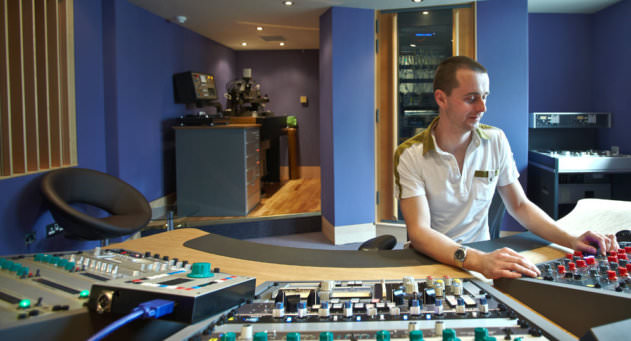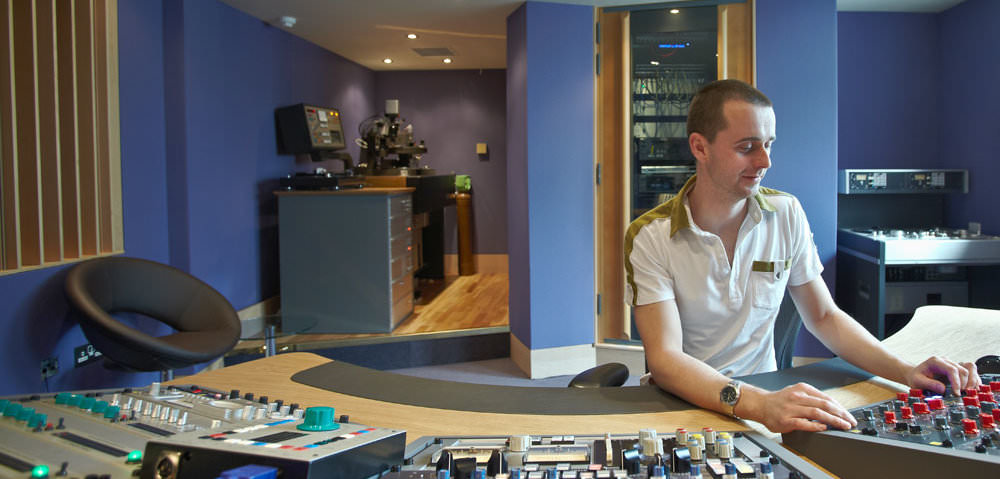Matt Colton, mastering engineer at London’s legendary AIR Studios, talks about the highs and lows of the job, outlines the skills required to become a world-class mastering engineer and sings the praises of a good lunch.

Name
Matt Colton
Place of work
AIR Studios, Hampstead, London
Job
Mastering Engineer
How long have you had the job?
I’ve been at AIR for three years but I’ve been a mastering engineer for 15 years in total.
Describe a typical working day
Hectic! I can work on anything up to 20 releases a week so a typical day would involve getting in between nine or ten in the morning and cutting records until ten or eleven at night.
I like to get as many clients to sit in as possible so I’ll usually have people with me at various point throughout the day.
If I’m mastering an album then that’ll probably be the only session I do that day – we’ll hang out and spend all day EQing and tweaking the audio until it sounds as good as it can, then later on in the afternoon or evening I’ll run out the parts.
If I have a day of mastering singles and 12-inches then sessions may only last two to four hours each, so I’ll have lots of different people in and out during the day.
Working with the clients present gets the best results in my opinion – the communication is instant and it’s easier for me to get a handle on how they want things to sound. It also means we can discuss and deal with any problems or issues that arise there and then. Plus it’s always more fun hanging out and having a laugh with people. Music should be fun and although we are getting a job done, I like my sessions to be chilled and relaxed – which makes for a more creative atmosphere.
We have a canteen at work that does really good food, so I usually dive in there for 15 minutes at lunchtime for a big-slap up lunch – working pretty late into the evening means I don’t eat in the evening that much. I try and cycle into work and back when I can; I find that physical exercise and fresh air really peps the brain up and improves both your listening skills and your decision making.
Highs of the job
Working with James Blake, and then seeing him eventually get a Mercury Prize nomination and rightly receive a gazillion other awards and nominations.
Being asked to remaster Faith by George Michael – a record that sold something like 30 million copies first time around.
Working with Markus Dravs on the last Coldplay album – a record that was probably the biggest album release of 2011.
Working with many hugely talented people that have since become friends such as the guys from Rekids, Veto Distribution, Dirtybird Records, R&S, Planet Mu, Rephlex and Firecracker, amongst others.
Hearing new labels and new artists come out and floor me with amazing new music. Recent examples include the Blackest Ever Black label, Peter & Kerry on Tape Club Records, Night Works on Loose Lips, Kuedo on Planet Mu, Vakula on Firecracker, Three Trapped Tigers and Om Unit on Civil Music.
Being asked to come and work at AIR Studios – set up by Sir George Martin – a company with a history in music to rival anyone ever.
Carving my name into a Kanye West record, a Depeche Mode record, an MF Doom and a J Dilla record, or the many other artists I’ve worked with that I have the utmost respect for.
Lows of the job
I pretty much work 60 hours a week, 50 weeks of the year. It takes a very heavy toll on all your personal relationships. To get anywhere in this industry you have to sacrifice quality time with family and friends.
Who are the people who’ve had the biggest influence on your career and why?
Paul Solomons was an engineer I worked with at Porky’s Mastering in the late 90s who taught me how to cut vinyl and made me think about mastering in a much bigger way than I had done previously. I owe him my whole career, for steering me on the right path. He worked with Leftfield, The Charlatans, Yazoo, Oasis and many more very successful acts.
Ray Staff is a legend who I have been lucky enough to work with pretty much every day for the last five years. He has taught me more in that time than I learnt in the ten years before. Ray has worked with some of the biggest names in recorded music history, including David Bowie, The Stones, Led Zeppelin and The Clash.
Ray and Paul are both engineers whom I have the highest respect for and who have been extremely generous in sharing their knowledge with me. To have them place faith and trust in my own skills is extremely flattering.
Other than that I would have to say my clients. I still feel very honoured and privileged that people trust me to work on their musical creations, and so many of them inspire me on a daily basis. To sit down and talk about production and music with Claude VonStroke or Radio Slave or Matt Elliott is a wonderful thing.
How did you get your job?
I started as a trainee in a studio in Soho called Porky’s Mastering in ’97 and worked in several different mastering rooms before AIR approached me in 2009 to come and work for them.
I still feel very honoured and privileged that people trust me to work on their musical creations.
How would we get a job like yours?
Spend 60 hours a week for the next 15 years listening to audio recordings and maybe then we can talk!
Joking aside, the only way to make it in music – whichever ever role you would like to have in the industry – is to make it happen for yourself. The industry has more and more people trying work in it every day whilst at the same time there being less and less money and fewer jobs.
If you want to become an engineer you are going to have to find your own clients before anyone is going to give you a job so you’re going to have to go out there and make that happen somehow. Find some bands, electronic artists or whatever and start working with them. Put on some nights or some gigs, build a scene. Put out your own records, carve your own niche somewhere, because there simply aren’t many jobs going in studios these days.
As far as specific skills go, you need massive amounts of dedication and stamina to be a successful mastering engineer. You need to develop great hearing and analytical skills to understand what it is you’re hearing. A good knowledge of physics also helps, plus all-round music knowledge and musical empathy.
You need a personality that attracts people to want to work with you. That can be anything you want – I’m pretty laid back and that suits my clients, other engineers I know are real showmen. On the flip side, some are real moody bastards!
Finally, you need to be 100 per cent on the case all the time, because you are quality checking someone’s art, and you are the last person in the chain to do that, so if it isn’t right when you’ve finished then there’s no-one else left to prevent your slip-ups.
How do you deal with music you dislike?
I frequently get asked that question. The short answer is it that it only happens once every ten years so it’s just not an issue. But if you’re the kind of person that can only stomach listening to UK funky, or folk music or whatever, then you’re going to struggle to find enough work to make a career out of being an engineer. Broad mindedness is key.

01.29 PM
cool! i wonder how much matt will charge to master my new track. haha!
01.37 PM
AMazing desk. Reminds me of the controls for an airplane.
07.17 PM
Quality interview. He does all the Rekids stuff which always sounds ace.
07.53 PM
He did quite a few of our releases, always made the tracks sound just that little bit better. He is king, period. Respect from us at Coincidence Records!
11.10 PM
Matt is ‘the man’, no doubt about it…he knows his shit, and is a lovely guy to boot. Every project I have ever worked on with him has ended up benefitting massively from his input, and has been a pleasure to do from start to end 🙂
11.43 AM
vakula is the best ))
03.30 PM
Great interview, interesting insights!
01.01 PM
Congratulations Matt on your award!